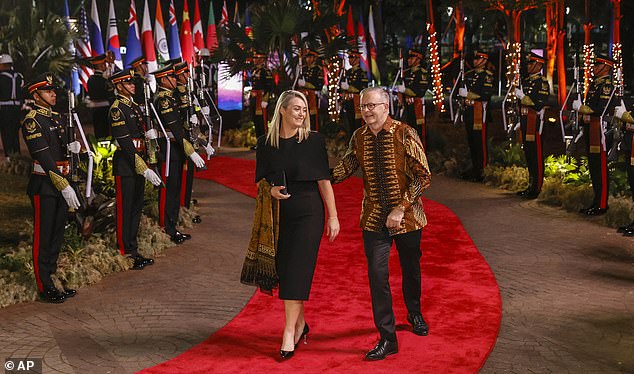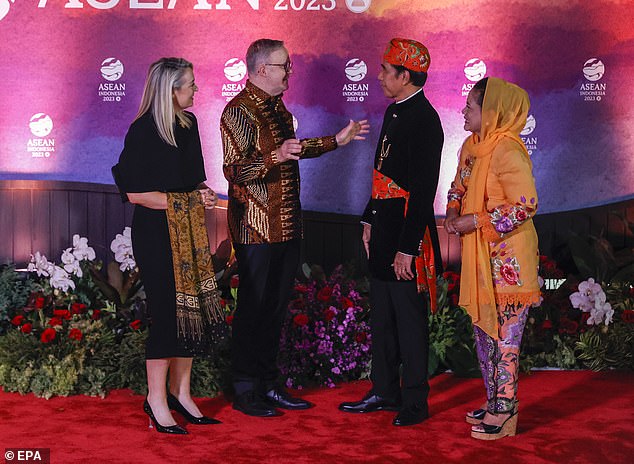Anthony Albanese and Jodie Haydon in Jakarta, Indonesia, for ASEAN summit
Anthony Albanese wore a traditional Indonesian shirt when accompanied by partner Jodie Haydon at the ASEAN summit in Jakarta.
The Prime Minister put a protective arm around Ms Haydon – who wore a simple black dress with matching heels – as they walked the red carpet before being greeted by Indonesian President Joko Widodo.
Speaking at the summit, Mr. Albanese said that security ties with the Indo-Pacific will be strengthened alongside an upgrade of economic ties with Southeast Asian countries.
Anthony Albanese wore a traditional Indonesian batik shirt as he was joined by partner Jodie Haydon at the ASEAN Summit in Jakarta

The Prime Minister put a protective arm around Mrs Haydon as they walked the red carpet
The Prime Minister has unveiled Australia’s South East Asia Economic Strategy for 2040, outlining ways to strengthen trade links with the region’s fastest growing economy.
The report lists 75 recommendations to strengthen trade and investment ties with the region, which is expected to become the world’s fourth-largest economy by 2040.
Initial initiatives for the strategy include spending $95.4 million over the next four years on investment opportunity teams, corporate exchange programs, and pilot placement programs for young professionals.
Mr Albanese said the government would try to implement all 75 recommendations in an “orderly manner”, saying the strategy would also strengthen security ties with Asian countries.
“There is a complete connection between the economy and economic relations and national security,” he told reporters in Jakarta.
“This is a positive report that will be viewed positively by all countries in Asia.”
Australia’s two-way trade with the ASEAN countries was about $178 billion last year – more than two-way trade with Japan, the United States or the European Union.
However, Mr Albanese said trade relations with the region were subpar.

Mr. Albanese and Mrs. Haydon were greeted by Joko Widodo and Indonesian First Lady Iriana
“Australia’s economic involvement in the region has not kept pace with the growth of Southeast Asian economies,” he said.
“The strategy we are outlining today reflects an enduring truth: this is where Australia’s economic destiny lies, and this is where our shared prosperity can be built.”
Special Envoy for South East Asia, Nicholas Moore, who developed the strategy, has identified ten priority sectors for Australia, including agriculture and food, resources, infrastructure, energy and education.
The strategy also calls for further efforts to lift trade blockades, including the establishment of an all-in-one service for further foreign investment.
Expanding infrastructure partnerships with the region, with a mix of public and private funds, is part of the plan.
The prime minister said a streamlining of Indonesia’s visas for Australia is still being explored.
“There is a migration assessment going on… my government is working through the issues in a logical, orderly way to make sure we get the right decision,” he said.
Mr Moore said South East Asia represents a lot of untapped potential for Australia.
“Our trade has remained constant as the region has grown. It’s a problem that our investments are actually declining,” he said.
Speaking at a business meeting in Jakarta to coincide with the launch of the strategy, the Prime Minister said net zero would be an important part of investment in the region.
“We know that as the world moves toward net zero, there is a particular challenge here in this region,” he said.
“Because you want to go to net zero while giving a much larger proportion of the population of Southeast Asia access to energy… that’s a challenge and a huge opportunity that we can seize.”
Albanese met Canadian Prime Minister Justin Trudeau on Wednesday on the sidelines of the ASEAN summit.
He will also hold bilateral talks with leaders from Laos, Malaysia and East Timor.
But despite improved trade relations with China following the removal of tariffs, the prime minister will not hold talks with Chinese President Xi Jinping, who is not attending the ASEAN summit or the upcoming G20 summit.
Premier Li Qiang will instead represent China at the G20.
“I am sure that Prime Minister Li will be present both here and in the G20 in the coming period and we will certainly be in the same room,” Albanese said.
‘China is of course our most important trading partner. We support trade with China and we have solved a number of problems.”
The Prime Minister also announced that ASEAN leaders would meet in Melbourne in March 2024, commemorating 50 years since Australia became an ASEAN dialogue partner.
